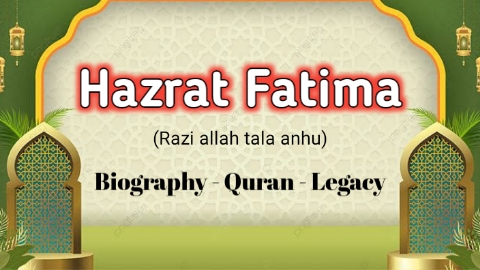
Among the most revered women in Islamic history is Hazrat Fatima Razi Allah Tala Anhu, the beloved daughter of Prophet Muhammad ﷺ and the wife of Caliph Ali ibn Abi Talib رضي الله عنه. Her life was a mirror of modesty, devotion, and deep love for Allah ﷻ and His Messenger ﷺ. Muslims around the world look up to her as an example of piety, patience, and sacrifice.
This article explores the biography, Quranic significance, and legacy of Hazrat Fatima Razi Allah Tala Anhu with heartfelt respect and deep Islamic insight.
Introduction
Hazrat Fatima Razi Allah Tala Anhu holds a unique and honored status in Islam. She was the youngest daughter of the Prophet Muhammad ﷺ and Khadijah bint Khuwaylid رضي الله عنها. Honored with titles like Az-Zahra (the Radiant) and Sayyidatun Nisa al-Jannah (Leader of the Women of Paradise), she embodied the highest ideals of Islamic womanhood.
She lived a life full of hardship and simplicity, yet her closeness to the Prophet ﷺ and her steadfastness in faith made her a pillar of strength for the early Muslim community.
Early Life and Upbringing
Born in Makkah, around five years before Prophethood, Fatima Razi Allah Tala Anhu grew up during the challenging early years of Islam. She witnessed the oppression faced by her father and remained deeply loyal to him.
As a child, she once wiped the filth thrown on the Prophet ﷺ while he was praying at the Ka’bah. Tearfully, she comforted her father, who told her:
“Do not cry, my daughter. Verily, Allah will protect your father.”
(Seerah Sources)
This moment reveals her deep emotional bond with the Prophet ﷺ and the early signs of her courage and compassion.
Marriage to Ali ibn Abi Talib رضي الله عنه
After the migration to Madinah, many noble companions expressed interest in marrying Fatima. The Prophet ﷺ chose none other than Ali ibn Abi Talib—his cousin and one of the bravest of his companions—as her husband.
Their marriage was simple, rooted in faith and mutual respect. The Prophet ﷺ is reported to have said about this union:
“Fatima is a part of me. Whoever angers her, angers me.”
(Sahih al-Bukhari)
Together, they had children who would become key figures in Islamic history: Hasan and Husayn, leaders of the youth of Paradise, and Zaynab and Umm Kulthum, who carried on the spiritual legacy of their mother.
Fatima Razi Allah Tala Anhu in the Qur’an
Though Hazrat Fatima Razi Allah Tala Anhu is not mentioned by name in the Qur’an, several verses are interpreted by scholars to include or refer to her and her family:
1. Ayah al-Tatheer (The Verse of Purification)
“Indeed, Allah desires to rid you—O Ahl al-Bayt—of all defilement and to purify you with perfect purification.”
(Surah Al-Ahzab 33:33)
According to many Hadiths, the “Ahl al-Bayt” in this verse includes the Prophet ﷺ, Ali, Fatima, Hasan, and Husayn.
2. Surah Al-Insan (76:8–9)
“”Out of love for Allah, they share their food with the poor, the orphan, and the prisoner, saying: ‘We do this solely for Allah’s sake, expecting no compensation or appreciation.’”
This verse was revealed after Fatima, Ali, and their household fasted for three days and gave away their meals to the poor each night. It highlights their sincerity and sacrifice.
Her Role in the Prophet’s Life
Fatima was not just a daughter to the Prophet ﷺ—she was his support, comfort, and the closest female companion during his lifetime. He would often say:
“Fatima is the most beloved of my family to me.”
(Musnad Ahmad)
Each time she came to his home, the Prophet ﷺ would stand to welcome her, kiss her forehead, and seat her in his place—a reflection of his profound love and respect.
Her Character and Worship
Despite her noble status, Fatima Razi Allah Tala Anhu lived a life of hardship and simplicity. She ground wheat by hand, fetched water from wells, and raised her children while maintaining deep spirituality.
She was known for:
- Frequent Du’a (supplication): Turning to Allah in all matters
- Patience during poverty and trials
- Love for charity: Giving whatever she could, even if it meant going hungry
- Modesty and Taqwa: Deep consciousness of Allah
At one point, she requested a servant from the Prophet ﷺ to ease the burden of her daily tasks. Instead, he offered her a spiritual gift—what is now known as Tasbih Fatimah, a set of phrases in remembrance of Allah.
SubhanAllah (33), Alhamdulillah (33), Allahu Akbar (34) – a Sunnah many Muslims practice today.
Her Passing and Final Days
Fatima Razi Allah Tala Anhu was deeply affected by the death of her beloved father ﷺ. Within six months of his passing, she too returned to her Lord, at the young age of around 29 or 30.
Before her death, she requested that she be buried at night in privacy—so her modesty would be preserved. This wish was fulfilled by her husband, Ali رضي الله عنه.
She was the first from the Prophet’s family to follow him in death, as he had told her:
“You will be the first of my family to join me.”
(Sahih al-Bukhari)
Her Everlasting Legacy
The legacy of Hazrat Fatima Razi Allah Tala Anhu lives on through:
- Her children, especially Hasan and Husayn, and their descendants
- Her character, serving as a role model for Muslim women in all times
- Her wisdom and spiritual teachings, passed down in Hadith and Seerah
- Her love for the Prophet ﷺ, showing us the importance of honoring the Messenger and his family
She is remembered not just as a historical figure, but as a living example of faith, resilience, and womanhood in Islam.
Conclusion: Fatima Razi Allah Tala Anhu – A Light for All Generations
In every way, Fatima Razi Allah Tala Anhu remains an inspiration for the Ummah. Her devotion, patience, and purity of heart continue to teach us what it means to live a life for the sake of Allah ﷻ. In times of ease and hardship, her example lights the way.
Let us strive to:
- Honor the Ahl al-Bayt with love and respect
- Uphold modesty, sincerity, and worship in our daily lives
- Teach our daughters the story of Hazrat Fatima Razi Allah Tala Anho as a living role model
“May Allah be pleased with Fatima, the radiant flower of the Prophet ﷺ, and unite us with her and the righteous in Jannah.”
Ameen.
